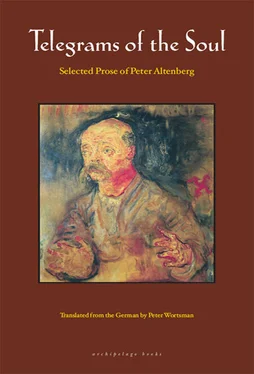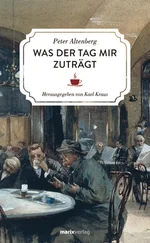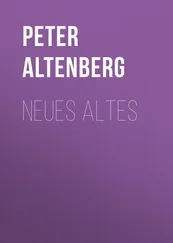Disenchanted adult or overgrown child, Altenberg never quite managed to break out of his self-constructed cocoon, except on the butterfly wings of his writing and the charmed cadences of his café conversation. Like his English contemporary, Lewis Carroll (1832–1898), Altenberg idealized childhood as the indigenous province of poetry and adulated children as its natural priests and purveyors. Like Carroll, he also flirted with a photographic (though to my knowledge, never practiced) pedophilia, prizing above all his possessions a collection of suggestive postcards, many of pre-pubescent girls. Like Carroll, he too managed to metamorphose (or sublimate) his worship of young girls into the stuff of literature. Did not Dante do the same with his Beatrice fixation and Petrarch with his predilection for Laura?
The fact that Altenberg clung psychologically to the province of childhood, reticent to forsake its cozy confines for the constant compromise and abject spiritual poverty of adulthood, can either be viewed — depending on your point of view — as indisputable proof of imaginative fortitude or a telltale sign of the emotional frailty that landed him in a mental asylum and ultimately led to his psychological and physical collapse. His Viennese contemporary, Sigmund Freud, would have had a field day analyzing a rife knot of neuroses, but analysis was not Altenberg’s inclination or forte and his neuroses proved nourishing. Thirteen books and a copious posthumous opus, including reams of letters and inscribed postcards, attest to a prodigious and prescient verbal fortitude that outlived his own collapse and that of the world that produced him.
Born into a prosperous assimilated Jewish family in Vienna in 1859, the young Richard Engländer (who later took the pen name Peter Altenberg) was labeled by a grade school teacher as a “genius without abilities.” The characterization bears a striking parallel to the title of the great Viennese novel, The Man Without Qualities, by Robert Musil (an ardent Altenberg fan), the first part of which appeared in print in 1931. Altenberg described himself as “the man without compromises,” in a concise five-and-a-quarter page long “Autobiography,” in his third book, Was der Tag mir zuträgt [What the Day Brings], 1901.
He flunked the writing segment of his high school graduation exam, as self-promulgated apocryphal legend has it, responding tersely to the theme: “The Influence of the New World,” with a single word: “potatoes.” Passing the test a year later, he took up and promptly abandoned the study of medicine, botany and the law, respectively, and half-heartedly explored the business of selling books, before finally concluding that he preferred to write them.
In 1883, a psychiatrist hired by his concerned father diagnosed “over-excitation of the nervous system” and concluded an “incapacity for employment.” Altenberg took it as a one-way ticket to Literary Bohemia and the life of the coffeehouse poet, of which he became the epitome, and never looked back. His befuddled, albeit tolerant, father provided a modest living allowance until the family business (subsequently bequeathed to a brother) went bust, leaving the down at the heels Bohemian henceforth beholden to the fickle kindness of strangers. The grateful son wrote of his father in the aforementioned “Autobiography”:
He [the father] was once asked: “Aren’t you proud of your son?!”
He replied: “I was not overly vexed that he remained an idler for 30 years. So I’m not overly honored that he’s a poet now! I gave him his freedom. I knew that it was a long shot. I counted on his soul.”
Long before his words found their way into newspapers and periodicals, Altenberg was well-known as a vetted Viennese eccentric who lodged in various hotels and traipsed around town in baggy clothes of his own conception (he was a pioneer in leisure wear), curious walking sticks and open sandals whatever the weather, favoring the companionship of young girls and loose women. He gave out as his official address the Café Central — also the sometime haunt of Russian émigrés Leon Trotsky and his chess partner Vladimir Ilyich Lenin — where Altenberg presided over his own table of garrulous caffeine-primed regulars.
How and when he first broke into print is the stuff of another homespun legend. One day, the author recalls, the members of Vienna’s ascendant literary avant-garde, Jung Wien, caught him scribbling away at his café table and immediately recognized his talent. The poet Richard Beer-Hoffmann is said to have first appreciated his writing, but it was the brilliantly sardonic critic Karl Kraus who sent Altenberg’s fledgling selection of prose to S. Fischer Verlag, the foremost German publisher of the day, which promptly published his first book, Wie Ich Es Sehe [How I See It] in 1896. The book was a popular sensation and immediately put its author on the map.
“If it be permitted to speak of ‘love at first sound,’ then that’s what I experienced in my first encounter with this poet of prose,” wrote Thomas Mann. Other impassioned literary partisans included the playwright Arthur Schnitzler, the poet and librettist Hugo von Hofmannstahl, and Felix Salten, the versatile author of, among other works, the children’s book classic Bambi and the underground pornographic classic The Adventures of Jose phine Munzenbacher.
Salten’s incisive description of Altenberg’s prose bears mention:
Some [of his pieces] are like steel projectiles, so tightly enclosed in themselves, so complete and precise in their form; and like projectiles, they pierce the breast; you are struck and you bleed. Some are like crystals and diamonds, sparkling in the multicolored reflections of the light of life, gleaming with captured rays of sunlight and glittering with a hidden inner fire. Some are like ripe fruits, warm with the waft of summer, swollen and sweet. .
And just next door in Prague, the young Franz Kafka took Altenberg’s terse writing style to heart and mind as a literary model for his own work. “In his small stories,” Kafka observed,
his whole life is mirrored. And every step, every movement he makes confirms the truth of his words. Peter Altenberg is a genius of nullifications, a singular idealist who discovers the splendors of this world like cigarette butts in the ashtrays of coffeehouses.
Coffeehouse poet par excellence, Altenberg claimed to toss off his texts in a cavalier fashion for the throw-away pages of weekly and daily newspapers. “I view writing as a natural organic spilling out of a full, overripe person,” he wrote in a letter to Schnitzler. “I hate any revision. Toss it off and that’s good—! Or bad! What’s the difference?!”
But tossed off, carefully crafted or both, there is nothing sloppy about his spare aesthetic. The extreme economy of his sketches sometimes reads more Japanese than Viennese — an elective affinity born out by the caption he inscribed for a lady friend on a postcard of Japanese women posing under blossoming cherry trees:
The Japanese paint a blossoming branch — and it is spring in its entirety! We paint all of spring — and it’s hardly a blossoming branch!
His Japanophile propensity is reiterated in the sketch “In Munich,” in which he presses his stuffy fellow Europeans to “Learn from the Japanese!” lauding the latter as “an artistic people.”
Altenberg’s first direct exposure to the Japanese sensibility occurred at the Sixth Exhibition of the Wiener Secession in 1900, a show exclusively devoted to the art of Japan though chronologically too late to have influenced his style, which appears to have sprouted Athena-like out of his brain and remained more or less unchanged throughout the two decades of his active writing career, this encounter with an alien world view must have felt strangely affirmative, more homecoming than departure, more mirror than window.
Читать дальше











